 Petzlover
Petzlover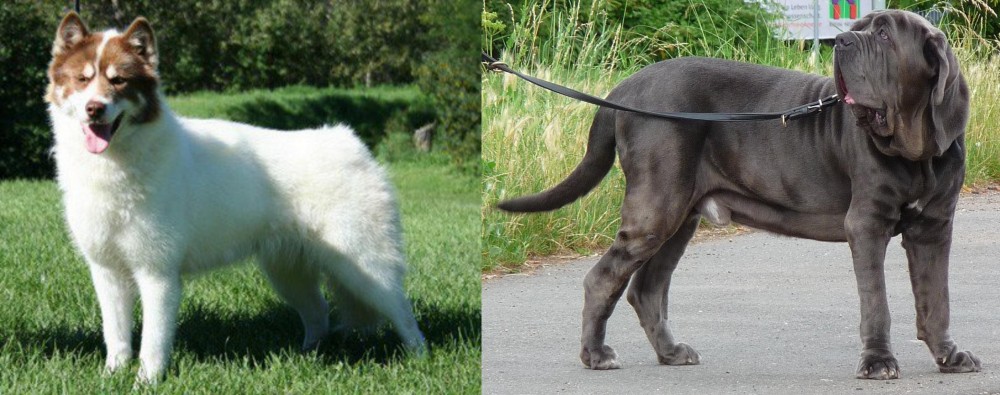 Canadian Eskimo Dog is originated from Canada but Neapolitan Mastiff is originated from Italy. Both Canadian Eskimo Dog and Neapolitan Mastiff are having almost same height. Canadian Eskimo Dog may weigh 39 kg / 85 pounds lesser than Neapolitan Mastiff. Canadian Eskimo Dog may live 6 years more than Neapolitan Mastiff. Canadian Eskimo Dog may have less litter size than Neapolitan Mastiff. Both Canadian Eskimo Dog and Neapolitan Mastiff requires Moderate Maintenance.
Canadian Eskimo Dog is originated from Canada but Neapolitan Mastiff is originated from Italy. Both Canadian Eskimo Dog and Neapolitan Mastiff are having almost same height. Canadian Eskimo Dog may weigh 39 kg / 85 pounds lesser than Neapolitan Mastiff. Canadian Eskimo Dog may live 6 years more than Neapolitan Mastiff. Canadian Eskimo Dog may have less litter size than Neapolitan Mastiff. Both Canadian Eskimo Dog and Neapolitan Mastiff requires Moderate Maintenance.
 The Canadian Eskimo Dog dates way back to more than 4,000 years ago. This Arctic breed of dog was developed to pull sleds, and wasn’t considered as a pet but as a working dog – an important means to an end – a tool for use.
The Canadian Eskimo Dog dates way back to more than 4,000 years ago. This Arctic breed of dog was developed to pull sleds, and wasn’t considered as a pet but as a working dog – an important means to an end – a tool for use.
By the 1960s the dog breed had declined to such an extent that they were removed from UKC and AKC registries. It is believed that the breed would have in all likelihood become extinct if it weren’t for the efforts of Brian Ladoon, William Carpenter and John McGrath who formed the Eskimo Dog Research Foundation in 1972.
After breeding for 30 years, the dog has the biggest genetic stock colony of Canadian Eskimo Dogs and in May 2000, Nunavut, a Canadian territory, adopted the dog as the animal symbol for this region.
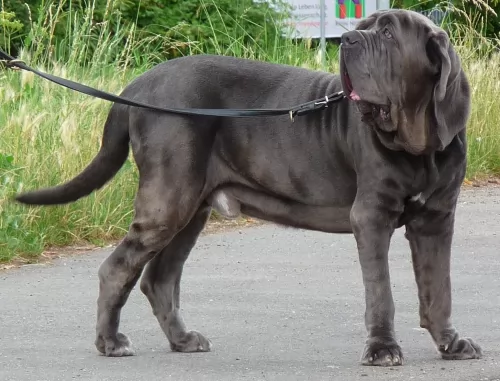 An ancient breed, the Neapolitan Mastiffs are massive dogs with a history of protecting their family and their property. The breed has deep rooted protective instincts and they are very frightening in appearance. The Neapolitan is of the Molosser group of dogs, all of whom probably came from the same line. It is known that all the mastiffs in Europe are descendants of the Tibetan Mastiff. The Tibetan Mastiff is considered the most ancient of all canines.
An ancient breed, the Neapolitan Mastiffs are massive dogs with a history of protecting their family and their property. The breed has deep rooted protective instincts and they are very frightening in appearance. The Neapolitan is of the Molosser group of dogs, all of whom probably came from the same line. It is known that all the mastiffs in Europe are descendants of the Tibetan Mastiff. The Tibetan Mastiff is considered the most ancient of all canines.
The Asian Mastiffs came from India to Greece around 300 BC with Alexander the Great. Then the breed was brought to the Romans by the Greeks and then introduced them in their circus in fights. Another possibility is that around 500 BC the mastiffs came to Britain from the Phoenicians. Either way the Roman Molossus is the ancestor of the Neapolitan Mastiff.
The Romans crossed the breed with the English Mastiff around 55 BC and developed a premiere war dog that was called a Mastini.
The breed eventually became extinct in Europe with the exception of Campania. The breed was recognized in 1946 with the standard accepted in 1949. However, it is believed that the Neapolitan Mastiff has been continuously present in Campania for over two thousand years. The breed was initially developed as war dogs and for the Roman coliseum spectacles.
In 1946 Dr. Piero Scanziani established a program to breed them in Italy. He wrote the breed standard in 1949.
Today the Neo is a farm dog, an army dog, a police dog and a guard dog. They were shown in Italy for the first time in 1946 but only in 2004 was the breed recognized by the American Kennel Club (AKC). It was 1973 when the Neapolitan Mastiff Club of America was born and 1996 when the standard was approved by the AKC. They are still a rare breed in the United States.
 The Canadian Eskimo Dog is a well-built, medium- to large sized dog looking much like a husky. The male Eskimo dog is somewhat bigger than the female, standing 58 – 70cm at the shoulder and weighing 30 - 40kg.
The Canadian Eskimo Dog is a well-built, medium- to large sized dog looking much like a husky. The male Eskimo dog is somewhat bigger than the female, standing 58 – 70cm at the shoulder and weighing 30 - 40kg.
The male often has some thick fur around the neck, giving him the appearance of looking larger than he actually is. He is slightly larger than the female. Other people say he has a similar appearance to a wolf.
He has a thick double coat which can be white, gray, fawn or even black and white. He has short, erect ears, dark brown eyes and a bushy, feathered tail which curls over the back. Sometimes you find blue eyes with the Canadian Eskimo Dog, and its only when you want to show him, that this isn’t acceptable.
The Canadian Eskimo Dog's temperament is hard working, tough, brave, alert and intelligent. When he is trained and socialized, which will be important for this breed, he becomes gentle and loving, forming a strong bond with his owner. He’ll also get along well with children in the home as well as other pets.
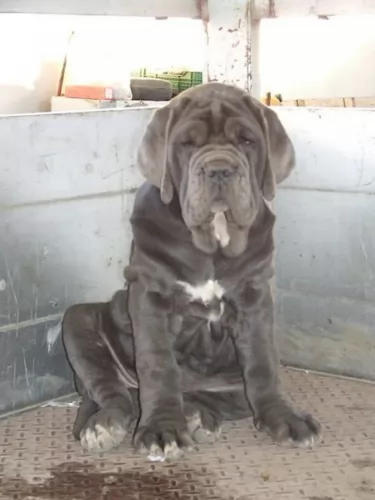 The Neapolitan Mastiff is a massive dog , so powerful and very intimidating in his looks. With an incredibly large head and hanging folds and wrinkles, the Neo is an impressive animal. His inner nobility and dignity is evident in his stance and the way he holds himself. He is relaxed, calm, quiet yet imposing none the less. His coat is dark whether black, tawny, gray or mahogany. He is muscular beyond imagination. The Neo is 10-15% longer than he is tall.
The Neapolitan Mastiff is a massive dog , so powerful and very intimidating in his looks. With an incredibly large head and hanging folds and wrinkles, the Neo is an impressive animal. His inner nobility and dignity is evident in his stance and the way he holds himself. He is relaxed, calm, quiet yet imposing none the less. His coat is dark whether black, tawny, gray or mahogany. He is muscular beyond imagination. The Neo is 10-15% longer than he is tall.
On his massive head his eyes are deep set and covered by his eye lids that droop. His eyes are blue as puppies then dark and coordinated with his coat. and his nose is large and the color of his coat. Ears are natural or can be cropped, and they carry their tail straight and curving back. The Neo has round paws and arched toes.
 The Canadian Eskimo Dog is a dog which is responsive to training. With training and socialization, as a highly intelligent, strong-will dog he will need to be supervised by a firm, authoritative figure.
The Canadian Eskimo Dog is a dog which is responsive to training. With training and socialization, as a highly intelligent, strong-will dog he will need to be supervised by a firm, authoritative figure.
He makes such an awesome pet when properly trained, and if you’re a responsible dog owner who knows how to care for- and exercise your pet appropriately, you’ll be rewarded by having a strong, loving companion at your side.
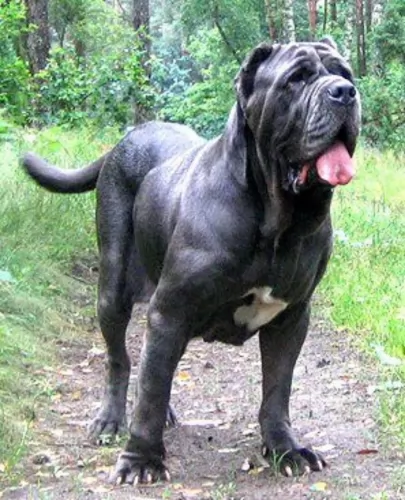 Older children in their family. No toddlers or strangers.
Older children in their family. No toddlers or strangers.
Protective yet quiet, calm, relaxed
No they won’t adapt well to apartment living or to strangers.
They are intelligent and trainable but must be socialized and know the human is the alpha or they will take over.
 The Canadian Eskimo Dog is a generally healthy breed who has a life expectancy of between 10 and 15 years when he is lovingly cared for and provided with a top quality diet. Ensure that he has a top quality diet with plenty of raw meat geared towards his age and energy levels.
The Canadian Eskimo Dog is a generally healthy breed who has a life expectancy of between 10 and 15 years when he is lovingly cared for and provided with a top quality diet. Ensure that he has a top quality diet with plenty of raw meat geared towards his age and energy levels.
The Canadian Eskimo Dog suffers from common health issues that most dogs are at risk for, and typically this will include hip dysplasia and eye disease. If your dog develops a disease such as hip dysplasia, speak to your vet immediately.
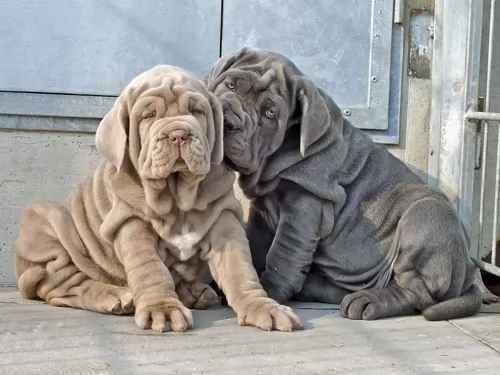 The Neapolitan Mastiff is prone to many of the same issues as any massive, extra large breed. The most common of these is Cherry Eye.
The Neapolitan Mastiff is prone to many of the same issues as any massive, extra large breed. The most common of these is Cherry Eye.
 The Canadian Eskimo Dog has always been a working dog, used to being driven hard to perform, and to this day he likes to work hard and have his day filled with activities.
The Canadian Eskimo Dog has always been a working dog, used to being driven hard to perform, and to this day he likes to work hard and have his day filled with activities.
His exercise requirements are high and this is one breed that you’re going to have to exercise regularly – long walks, running on a leash as you cycle, ball games, swimming, hiking. It is why the dog is best suited for life in the country as opposed to small properties in the city. If exercise seems like a lot of hard work for you, don’t buy such a breed as it will be cruel and irresponsible to leave him day after day in your back yard. He becomes bored, frustrated, unhappy and destructive.
The dog is an average shedder and his coat is short and dense. There’s not a whole lot of maintenance to worry about with this good-looking dog and he will basically require having a good brush twice a week.
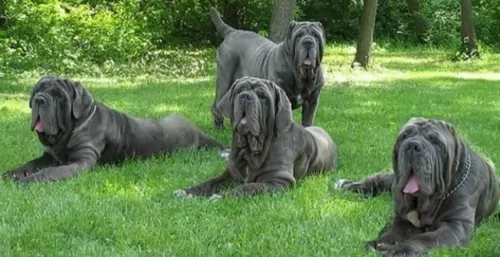 Neapolitans grow fast and so don’t overfeed when they are young. Lower protein and higher fat content.
Neapolitans grow fast and so don’t overfeed when they are young. Lower protein and higher fat content.
Don’t overfeed the adult as they can become obese.
This big hearty breed needs exercise but not too much. They overheat easily. The puppy will push himself, so you have to make sure he doesn’t over do it. No tug of war games. They need a long walk twice every day.